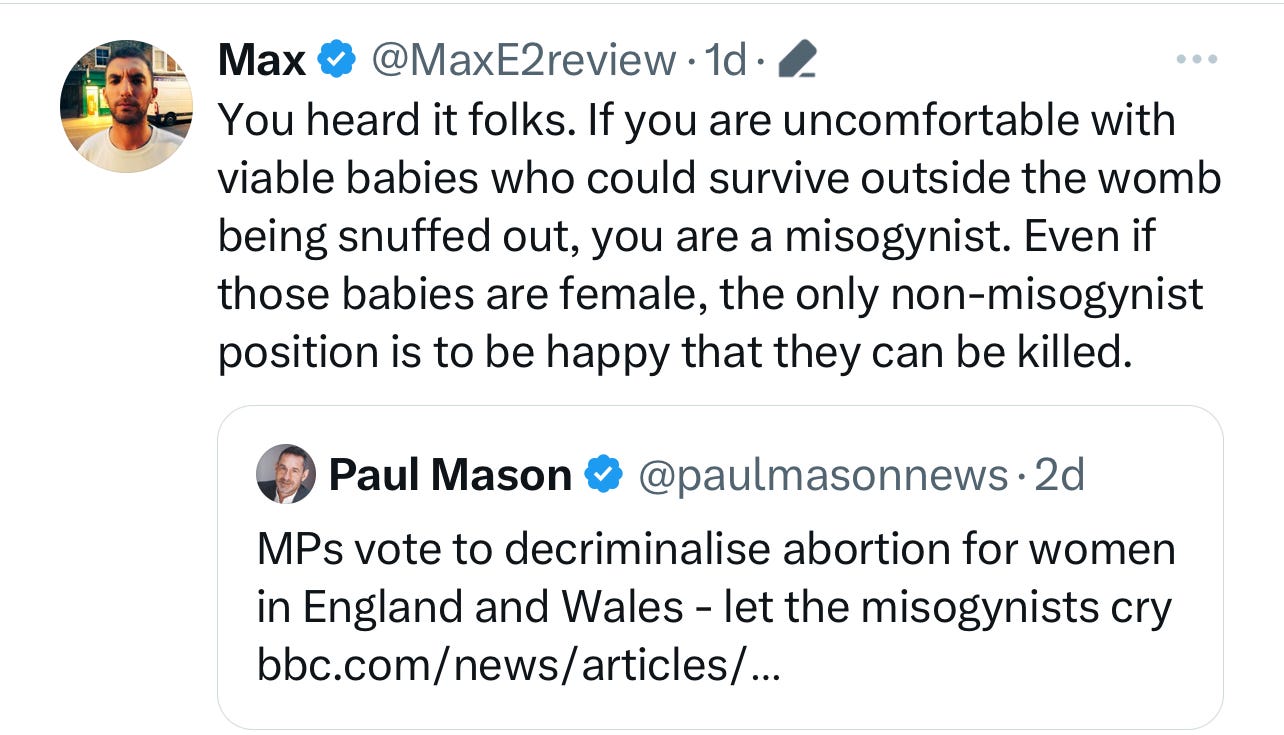Infanticide and moral inversion
British MPs just voted to decriminalise abortion at any point up until birth. This is not a 'step forward'.
A baby born prematurely
I’ve written in the past about moral inversion. It’s a useful term for the ideologically-driven flipping of basic, almost primal notions of right and wrong—whereby actions, values and social phenomena that any common-sense reading would deem as beneficial are cast in a negative light, and those that ought to be condemned are rebranded as virtuous.
Progressivism at present is riddled with this mode of thought. The problem, we’re told, isn’t violent criminals attacking pensioners on public transport; it’s those who risk their own safety to stop them. The real issue isn’t jihadists screaming “Allahu Akbar” while blowing up, stabbing, and shooting civilians; it’s anyone who dares to suggest such attacks might have something to do with Islam. The tolerant West is a dystopian hellhole that must be blamed for all global ills, but repressive, autocratic theocracies aren’t so bad. I could go on, but you get the picture.
I mention moral inversion here because it provides a helpful framework through which to understand why British MPs have just approved an amendment to the Government’s Crime and Policing Bill that will allow women to kill their unborn babies at any stage of pregnancy until the moment they’re born, and for any reason (not only medical ones), without facing criminal sanctions. It passed by a large majority of 379 votes to 137.
Under the terms of the revised legislation, the legal cut-off for abortions in England and Wales will remain at its current 24-week limit, and two doctors’ approval will be required. But if a woman self-administers abortifacients (i.e., pills or any other substances that induce abortion or miscarriage), or induces herself to miscarry by other means, she will now face no risk of prosecution.
Amazingly, this was not even the most extreme reform on the table. An amendment by Labour MP Stella Creasy, to enshrine abortion as a ‘human right’ in British law and decriminalise all abortions at any point during pregnancy—including sex-selective ones—and to ensure no doctors or other parties involved could ever be held legally accountable, did not go to a vote.
Take a moment to consider what that means in practice. Here’s a hypothetical scenario: A husband and wife are expecting a baby soon (potentially the next day). They’ve had several ultrasounds; it has been repeatedly confirmed that the baby is healthy. The husband carries a photo of the latest scan in his wallet—it shows his unborn daughter, all her fingers and toes visible, her tiny features clear. He’s watched her heart beating on the monitor, and has walked past the neonatal unit in the hospital in which premature babies significantly younger than the one his wife is carrying have been born and are being cared for as they take their first breaths.
They have a row. The wife snaps. She decides she doesn’t want a child anymore. She threatens to take abortion medication. The husband pleads with her not to. She ignores him, takes the pills and miscarries.
As far as I can tell she would face no legal consequences as a result, unless it could be proven beyond reasonable doubt that the infant was born alive and she neglected to save its life (another minefield that this amendment has opened the door to).
Proponents of this law counter that very few if any women would do such a thing, and the pills probably wouldn’t work at that stage anyway. Kathleen Stock has summed up the logical flaws here well: ‘The law against late-term abortions acts as a deterrent against mothers killing their babies. If you lift it, you will get more deaths. You say it’s only a few – is that really supposed to be an argument? And; If I am not supposed to care about “only a few” baby deaths, why am I supposed to care about only a few prosecutions?
Again, if you are reasoning like this, and especially if you are weighing it up only against the mother's alleged right to non-prosecution, then you have your priorities badly skewed, and have conveniently forgotten that deaths of babies are also involved. And while we are at it: how do you know it will only be a few baby deaths in years to come? Do you know what happens when new social norms get embedded around new technology, and other ones – say, around contraception – shift? The use of at-home abortion pills is relatively new, who knows where it will be in ten years’ time?’
She’s right. The fact that a small number of people are likely to commit a gruesome crime doesn’t mean we should therefore decriminalise it. And besides, such scenarios are not unheard of. Sarah Catt was jailed in 2012 for aborting her baby 1 week before the due date; Carla Foster did the same at 34 weeks and was similarly locked up in 2023. Were they to do the same thing now, both women would go unpunished.
The ‘pro-life’ position is often caricatured as the domain of fundamentalist zealots. But religious faith is not a pre-requisite to find the idea of ending late-stage pregnancies for non-medical reasons deeply troubling. The late, great Christopher Hitchens, arguably the most prominent atheist of the past half-century, had grave misgivings about it. As he put it with characteristic eloquence: ‘I [have] a queasy feeling about the disposability of the fetus. Once you allow that the occupant of the womb is even potentially a life, it cuts athwart any glib invocation of ‘the woman’s right to choose’.
We know with absolute certainty that late-term abortions kill babies that would be able to survive outside the womb. They are not a ‘clump of cells’ at that stage but conscious beings with their own interests, independent of those of the mother. The readiness with which so many ‘feminists’ (and others) disregard this fact is callous to a degree that verges on psychopathy. It illustrates in stark terms the harm that can result from the uncritical acceptance and institutionalisation of dogma.
The destruction of tiny human beings is being facilitated, and heralded as progress.
Moral inversion.
If you feel like supporting my work, why not consider upgrading to a paid subscription? They are a huge help.
If you could please subscribe below, leave a comment, and ‘like’ this article it would be much appreciated.
Thanks!







And now I'm left with conflicting ideas. What is living? I ask myself. How valuable is a life? You've got me thinking (oy vey!).